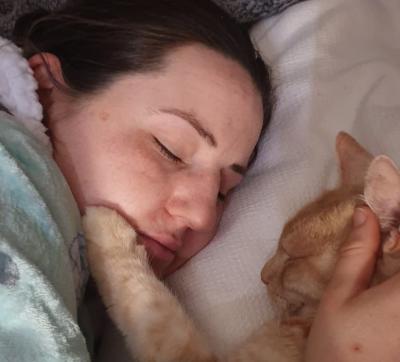Lili, 32, felt her experience of diagnosis aged seven was “weirdly fine”. She took control from that young age, managing her diabetes independently. Consistent psychological support helped her cope when she found things harder as an adult.

Lili said: “I was aware that everybody seemed to think it was a massive deal, but I didn't see what all the fuss was about at the time. I remember thinking that it might make me a 'better' person in some way, because I would have an understanding of living with a condition and it might help others, and perhaps that it made me metaphorically stronger. I was a child who was doing all the diabetes stuff and all the normal stuff.”
Like many other young people, going to university and being away from home was difficult, and she found it harder to manage her diabetes. Lili said:
“I went to university in Lampeter, so I registered with the GP surgery there. I wanted to make sure I had all my medications available and all the right care. I had poor diabetes management at the time but found the system in Wales different, and no interest from my GP and nurse in supporting me."
"In England, I was seen every two weeks to ensure I was taking insulin correctly. I was told that I would see a GP in Wales only once a year. When I saw him, he was not sympathetic and dismissed me. I went back to my university halls afterwards and sat and cried with my friend about it. A distinct lack of care, and of anybody who would listen to me telling them that I knew something was wrong led to me developing acute neuropathy and becoming basically bed-ridden for about six months.”
Consistent psychological support made all the difference
Lili chose to access care in England during her university course and paid for private therapy sessions. She explained: “I think my poor mental health results from a combination of the diabetes stuff, possibly a small genetic element, and that it's suspected that I may have an autism spectrum condition. I would've benefitted hugely from psychological support from a much younger age because my problems were quite entrenched when I struggled to cope.”
After graduating, Lili decided to move permanently to Wales. She fought to be referred to a consultant at the hospital and finally succeeded.
“I then saw an NHS psychologist for about 18 months who specifically worked with people where there was a strong link between their physical and psychological health. That made all the difference. The frustration of diabetes is often the hardest part. I'm not someone who copes well with frustration or a lack of control, so things like the inconsistency of blood glucose levels drive me nuts. I wish there was a reliable formula for working out insulin, even if it was super complex because it factored in all the ingredients in your food, your stress levels, and how hard your immune system's working your hormone levels, and the weather."
Lili feels she is coping 'ok' now and wears a Dexcom G6 continuous glucose monitor and a Medtronic insulin pump, connected to her phone and Fitbit, which she finds handy: “I can wander about the classroom without needing to carry and look at my phone to keep an eye on things. The children all know what the various beeps mean too. They say: 'Miss, your phone's beeping. Shall I bring it to you? Shall I get your Lucozade?'"
The staff at school are understanding, as are the children. A pupil was diagnosed last year, so I've made an effort to get to know him a bit to try to help him feel less isolated.”
She gets support from her family, friends and her cat: “I really think there should be wider recognition for the role that animals can play for people suffering from physical and mental health conditions.”
Do you have a story to share? Please get in touch with the Wales team.
